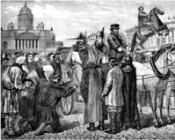
Alexander II signed a Manifesto on serfdom abolishment
On February 19 (March 3), 1861 in St.-Petersburg the emperor Alexander II signed a Manifesto ‘On donation to the serfs the rights of free villagers’ and the Statutes on peasants freed from serfdom comprising 17 legislative acts. In accordance with these documents the peasants gained a personal freedom and the right to dispose of their property.
The peasants’ reform was preceded with a long work of elaborating the legislative acts projects on serfdom abolishment. In 1857 under the decree of Alexander II was created a Secret Committee for peasants’ affairs with a view to elaborate measures on improving of peasantry position. Later the government formed the provincial peasants committees from local landowners. The committees had to elaborate their own proposals regarding the project of serfdom abolishment.
In January of 1858 the Secret Committee was renamed to the Chief Committee for the villagers’ arrangement. It was presided by the tsar and included 12 highest tsar’s dignitaries. Under the Committee were organized two editorial boards charged with the collection and systematization of the provincial committees’ opinions (actually functioned only one board headed by the general Ya. I. Rostovtsev). The project of ‘Statutes on peasants’ prepared in summer of 1859 was subject to a series of changes during the discussion.
The documents signed by the emperor on February 19 (March 3), 1861 produced an ambiguous reaction from all the levels of the population due to the half-hearted measures.
In accordance with the Manifesto the peasants were granted the civil rights – the freedom to marry, conclude the contracts and conduct legal cases, acquire real estates, etc.
The peasants were also granted a legal freedom but the land was announced the property of landowner. For the allotments (reduced in average by 20%) the peasants had to fulfill the duties not very different from the previous ones they had during the serfdom. The allotments to peasants and the order of duties were determined upon a voluntary agreement between landowners and peasants.
To buy the land the peasants were given a grant in a form of a loan. The land could be bought by a community as well as by an individual peasant. The land allotted to the community was in the collective possession. Therefore if a peasant passed to another estate or another community he lost his right for the former ‘village-community land’.
Delight brought by the Manifesto issue soon was replaced by deception. The former serfs expected a complete freedom and were unsatisfied by the transitional situation they found themselves in, having to pay the duties until they bought the land out. Supposing that the government conceals a real meaning of the reform, the peasants revolted demanding the liberation with land allotments. In order to suppress the largest protest actions accompanied with the seizure of power as in the villages of Bezdna (Kazan province) and Kandeevka (Penza province) the troops were called up for.
In spite of this the peasant’s reform of 1861 had a great historical meaning. It opened new perspectives in front of Russia providing the opportunities for the market relations development. The serfdom abolishment made a good start for other significant reforms intended to create a civil society in Russia.
Lit.: Зайончковский П. А. Крестьянская реформа 1861 // Большая советская энциклопедия. Т. 13. М., 1973; То же [Электронный ресурс]. URL: http://slovari.yandex.ru/~книги/БСЭ/Крестьянская%20реформа%201861/; Манифест 19 февраля 1861 г. // Российское законодательство X-XX вв. Т. 7. М., 1989; То же [Электронный ресурс]. URL: http://www.hist.msu.ru/ER/Etext/feb1861.htm; Фёдоров В. А. Падение крепостного права в России: Документы и материалы. Вып. 1: Социально-экономические предпосылки и подготовка крестьянской реформы. М., 1966; Энгельман И. Е. История крепостного права в России / Пер. с нем. В. Щерба, под ред. А. Кизеветтера. М., 1900.
Based on the Presidential Library’s materials:

